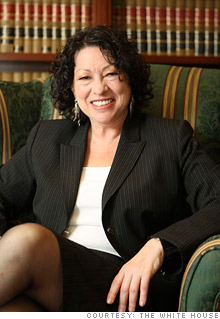Sotomayor: Important business awaits
President's nominee to Supreme Court, if confirmed, will come to a court with a docket that already contains some key business cases.
 |
| Judge Sonia Sotomayor was nominated to serve on the Supreme Court on Tuesday. |
WASHINGTON (CNNMoney.com) -- Business advocates started scrambling on Tuesday to figure out whether Supreme Court nominee Judge Sonia Sotomayor would be good or bad for companies.
But one thing was clear: If confirmed, she will be able to make her mark on business issues quickly, because a handful of key cases are already on the docket.
Companies and legal experts are scouring Sotomayor's past opinions to glean clues about how she could rule on business issues.
The Supreme Court has already agreed to consider several high-profile cases in the new term, which starts Oct. 5.
"The stakes are incredibly high with respect to business issues," said Elizabeth Nowicki, an associate professor who teaches business law at Tulane University in New Orleans.
Among the issues are questions about corporate governance and securities fraud, Nowicki said.
In fact, the high court added a new one to the roster on Tuesday. The justices agreed to consider a case involving Merck & Co. (MRK, Fortune 500) that addresses how long investors can wait before making a securities fraud claim.
President Obama said he wants the Senate to confirm Sotomayor by the time of the congressional August recess, according to senior administration officials.
If confirmed, Sotomayor, 54, would be the first Hispanic and the third female Supreme Court Justice. She has been a federal judge since 1992, after being appointed to a federal trial court bench in New York by President George H.W. Bush. She was elevated to the appeals court by President Clinton in 1997.
One of Washington's most powerful business groups indicated it will play a role over the next few weeks.
"The Chamber intends to be deeply involved in the confirmation process as it unfolds," Robin Conrad, executive vice president of the National Chamber Litigation Center, an arm of the U.S. Chamber of Commerce, in a statement.
When it comes to business issues, it can be difficult for lobbyists to predict how a judge will rule once they are on the court. Judicial leanings often don't match typical ideological patterns, legal experts say.
For example, outgoing Justice David Souter was a Republican appointee but was considered a moderate on most business issues.
"People are going to be focused on the liberal versus the conservative question, but business cases tend to cut across those lines," said Lauren Goldman, an appellate attorney with Mayer Brown.
Souter was considered pro-business when it came to limiting punitive damages, or monetary awards that go beyond compensating to punish the at-fault party. In 2008, Souter wrote the high court's decision to slash almost $2 billion from punitive damages that Exxon Mobil Corp. (XOM, Fortune 500) had originally been ordered to pay for the 1989 Exxon Valdez oil spill off the coast of Alaska.
"Justice Souter has been reliably hawkish with jury awards to punitive damages, but it remains to be seen whether Sotomayor would follow the same path," said Stephen Kinnaird, an appellate attorney at Paul Hastings.
Generally speaking, Sotomayor is also considered pretty moderate, at least when it comes to other issues businesses care about, such as limiting class action lawsuits and pre-empting state laws with federal laws, several attorneys said. She has ruled for investors and companies in many different types of cases.
"Both investors and corporations are going to be holding their breath to see what she does in the first few cases, because she just has no clear ascertainable bias for companies or investors, which is ideal," Nowicki said.
What's on the docket? In the upcoming the case of Merck v. Reynolds, the Supreme Court will consider how long investors can wait to file a securities fraud suit.
Merck investors want billions of dollars because, because they claim the company mislead them about clinical trial results that linked the pain medication Vioxx to heart attacks. Merck argues the investors waited too long to file, but a lower court offered a more lenient time frame for investor cases to be filed.
Business groups are closely following at least two other pending cases.
The Supreme Court has agreed to consider a constitutional challenge to the Sarbanes-Oxley Act, a series of corporate governance measures passed in the wake of the Enron collapse in 2002.
The court will consider whether the selection and removal of Public Accounting Oversight Board members violates the constitution on separation of powers. But companies that don't like the accounting board and other strict rules imposed by the Sarbanes-Oxley Act are keen to have the entire act considered unconstitutional, which is possible.
In another case, the Supreme Court has agreed to consider whether an investment adviser's fees were too high and violated standards set by the Investment Company Act of 1940. ![]()

